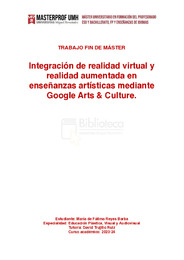Por favor, use este identificador para citar o enlazar este ítem:
https://hdl.handle.net/11000/33018Integración de realidad virtual y realidad aumentada en enseñanzas artísticas mediante Google Art & Culture
| Título : Integración de realidad virtual y realidad aumentada en enseñanzas artísticas mediante Google Art & Culture |
| Autor : Reyes Barba, María de Fátima |
| Tutor: Trujillo, David |
| Editor : Universidad Miguel Hernández de Elche |
| Fecha de publicación: 2024 |
| URI : https://hdl.handle.net/11000/33018 |
| Resumen : La generación Alpha ha hecho su aparición, refiriéndonos a los actuales y futuros estudiantes que están creciendo en un entorno inmersivo de realidad virtual y aumentada. Estos estudiantes están desarrollando habilidades cognitivas, actitudes y hábitos tecnológicos. Es bien sabido que un uso excesivo y constante de estas tecnologías puede tener efectos adversos durante el desarrollo del estudiantado, pero los beneficios educativos que se pueden obtener no son tan reconocidos. Los docentes pueden integrar aplicaciones y contenido digital en la planificación de sus clases, emplear diversas metodologías de enseñanza y realizar evaluaciones utilizando rúbricas digitales. En el campo de la educación artística, donde los contenidos son altamente visuales, existen varias aplicaciones que pueden ser herramientas para el aprendizaje, ayudando a obtener buenos resultados en las evaluaciones y proyectando un aprendizaje significativo en los estudiantes. Por esta razón, este estudio se centrará en la plataforma en línea Google Arts & Culture como herramienta educativa. Se analizará cómo esta plataforma puede integrarse en el contexto educativo, adaptándose a las necesidades específicas de cada docente y su grupo de estudiantes. Además, se evaluará la capacidad de estas aplicaciones para permitir una programación de aula integrada, facilitando a los docentes abordar diferentes aspectos curriculares y competencias. Si todos los docentes adoptan esta iniciativa, se puede maximizar el uso de las TIC´s para proporcionar un conocimiento integrado e interdisciplinar entre las diferentes materias, otorgando igual importancia a todas ellas. Además, la implementación de estas herramientas se llevará a cabo de manera global, coherente y conectada para facilitar el aprendizaje de nuevos conocimientos. Así, en esta investigación, se explorará y analizará la plataforma Google Arts & Culture en relación con la educación artística, examinando la implicación de la realidad virtual y aumentada en el proceso de aprendizaje. También se realizará un estudio práctico, destacando las capacidades integradoras de estas herramientas sin perder de vista el objetivo principal del aprendizaje: mejorar la calidad y cantidad de los conocimientos adquiridos. The Alpha generation has made its appearance, referring to current and future students who are growing up in an immersive virtual and augmented reality environment. These students are developing cognitive skills, attitudes, and technological habits. It is well known that excessive and constant use of these technologies can have adverse effects during the development of students, but the educational benefits that can be obtained are not as recognized. Teachers can integrate applications and digital content into their lesson planning, employ various teaching methodologies, and conduct assessments using digital rubrics. In the field of artistic education, where the content is highly visual, there are several applications that can be tools for learning, helping to obtain good results in evaluations and projecting significant learning in students. For this reason, this study will focus on the online platform Google Arts & Culture as an educational tool. It will be analyzed how this platform can be integrated into the educational context, adapting to the specific needs of each teacher and their group of students. In addition, the ability of these applications to allow integrated classroom programming will be evaluated, making it easier for teachers to address different curricular aspects and competencies. If all teachers adopt this initiative, the use of ICT can be maximized to provide integrated and interdisciplinary knowledge between different subjects, giving equal importance to all of them. Furthermore, the implementation of these tools will be carried out in a global, coherent and connected manner to facilitate the learning of new knowledge. Thus, in this research, the Google Arts & Culture platform will be explored and analyzed in relation to artistic education, examining the implication of virtual and augmented reality in the learning process. A practical study will also be carried out, highlighting the integrative capabilities of these tools without losing sight of the main objective of learning: improving the quality and quantity of the knowledge acquired. |
| Notas: Especialidad: Educación plástica, visual y audiovisual |
| Palabras clave/Materias: Experiencia virtual Recursos educativos Competencia digital |
| Tipo de documento : info:eu-repo/semantics/masterThesis |
| Derechos de acceso: info:eu-repo/semantics/openAccess |
| Aparece en las colecciones: TFM - M.U Formación del Profesorado ESO y Bachillerato, FP y Enseñanzas de Idiomas |
 La licencia se describe como: Atribución-NonComercial-NoDerivada 4.0 Internacional.
La licencia se describe como: Atribución-NonComercial-NoDerivada 4.0 Internacional.
.png)
